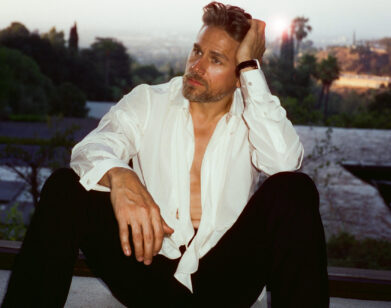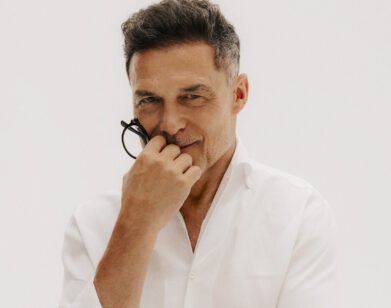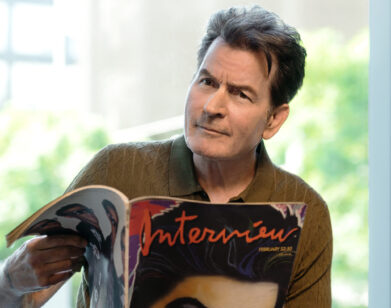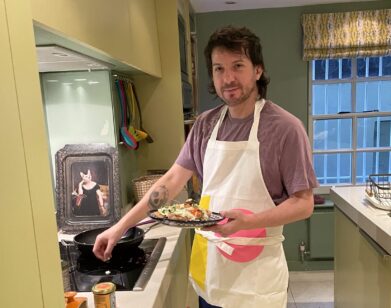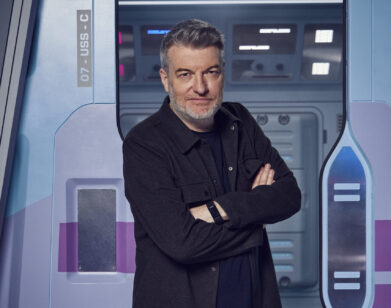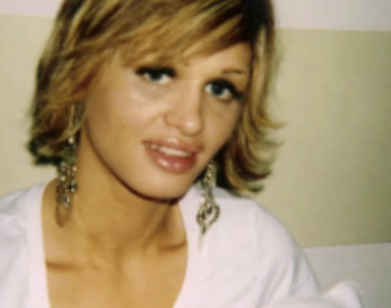IN CONVERSATION
Nicholas Alexander Chavez Tells Javier Bardem How He Became a Monster
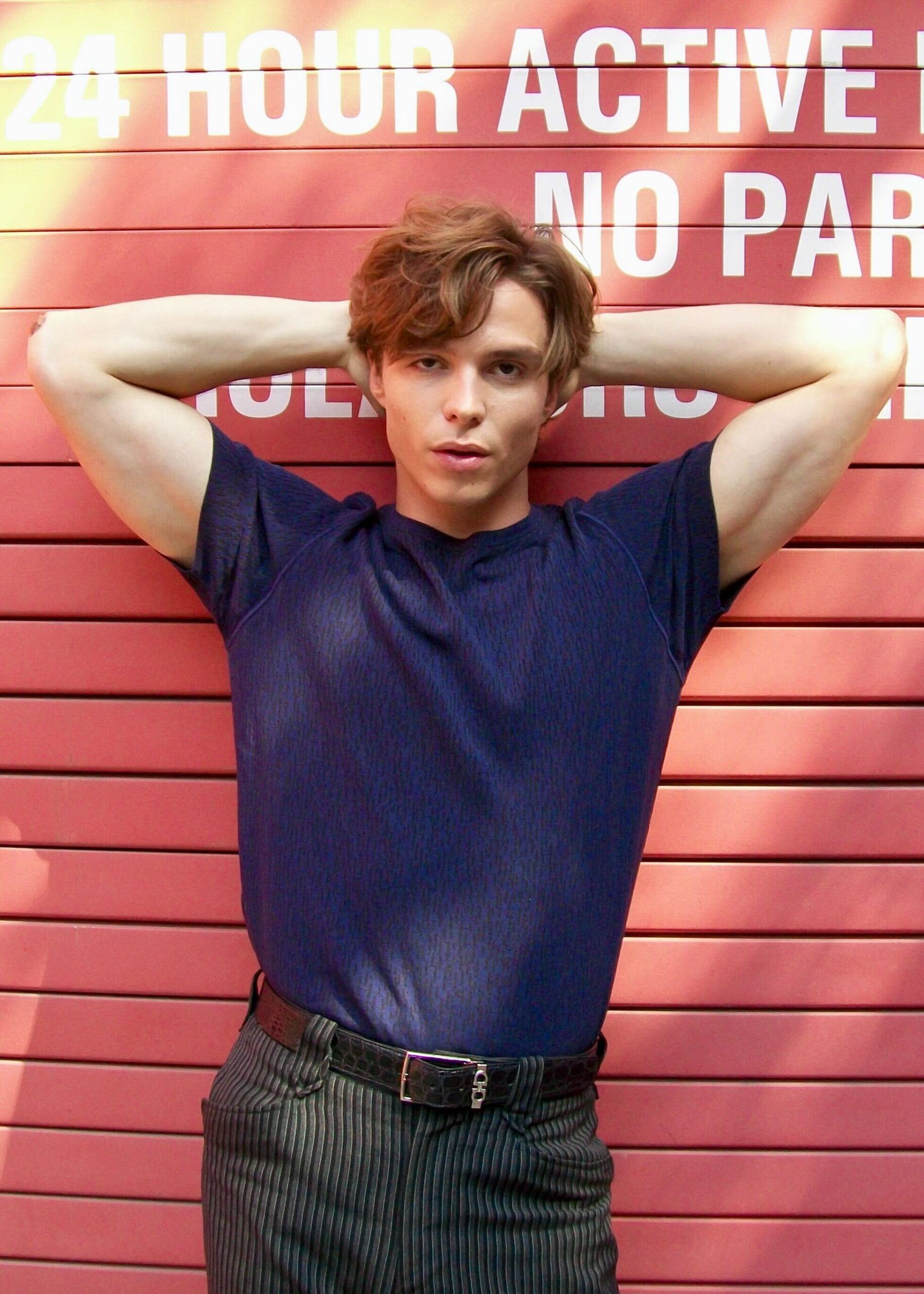
Nicholas Chavez, photographed by Julian Ribeiro.
25-year-old actor Nicholas Alexander Chavez had never heard of the Menendez murders before his agent him sent him an open call for the role of Lyle Menendez in the new season of Ryan Murphy’s anthology series, Monsters. Lyle is the elder of the two Beverly Hills brothers who brutally murdered their parents with shotguns in their living room, resulting in a messy and sensationalized trial that gripped the country in the ’90s. Living only a mile or so from the real-life Menendez home, Chavez would sit on the front steps during the audition process, hoping the family’s fraught energy would “pour into” him. Evidently, it worked: Chavez got the part and—with his co-star and on-screen brother Cooper Koch—inhabits the family’s generational trauma with chilling command. To mark the series release, he got on a call with Javier Bardem, who plays his on-screen father, Jose. In conversation, the two dissected the explosive and twisted relationship between father and son and how they managed to keep things grounded and playful on set.
———
NICHOLAS ALEXANDER CHAVEZ: Javier, how are you?
JAVIER BARDEM: Do you see me?
CHAVEZ: Oh, there you are.
BARDEM: The connection here is horrible, man.
CHAVEZ: Where are you?
BARDEM: I’m in Madrid. Also, happy birthday!
CHAVEZ: Oh, thank you. It’s been nice, man. The family came out to New York to celebrate. We went to see the billboard in Times Square, which was a lot of fun.
BARDEM: How do you feel about the show coming out?
CHAVEZ: The trailers all look beautiful, and it’s such a fun experience being on the precipice of it. I was thinking last night, “The best part is that there’s no way to plan how this is all going to go.” That’s the best and the worst part of it. You know what I mean?
BARDEM: Absolutely. Will you feel like you showed your full capacity as an actor in nine episodes? It’s a big test. You and Cooper are carrying the whole weight of the show on your shoulders. You are deeply immersed in what you have to go through, to the point where it’s kind of scary to look at.
CHAVEZ: Yeah. It took us about six months to shoot it, and there’s definitely a lot of heavy lifting involved. But you and Chloe [Sevigny] came to play every single day. The whole cast was such an impressive ensemble. It’s a big story, and what adds a layer of difficulty is that these are real people, and you want to make sure that you are doing them justice. This has been a really compelling challenge for me as an actor. It’s forced me to up my game. I couldn’t afford to show up as anything other than my best self and bring my heart and soul every single day. I mean, how do you handle it? Sometimes you’re juggling multiple projects at once.
BARDEM: Yeah, but let me tell you, I don’t recall having been in a place like you and Cooper [Koch]. I’ve never been on such a demanding project for so long on a daily basis. I want to go back to the first day I went to set, after the rehearsal. It was fantastic to see how you guys created the chemistry for the brothers. You both were so in tune, so intimate with each other and so supportive. Even on the first day, you made me feel like you were brothers that love each other and would fight to death for each other. But what struck me the most when I was watching you work was how fearless you are, Nicholas. How far you go with yourself, your intensity, your soul, and how creative and detailed you are as an actor of your age. I think you’ve just turned 25, if I’m not wrong?
CHAVEZ: Correct.
BARDEM: When I was 25, I was still eating my pickles. And you were dealing with all the demands of acting—physically, emotionally, mentally, artistically, professionally. You were giving the very best of yourself on every take. At the same time, you’re here talking about it, sane and healthy and happy. I mean, how were you able to come in and come out?
CHAVEZ: I had an incredibly supportive team around me. Not only the writers, directors and producers, but also my family. I remember telling you, “Javier, from behind you look a lot like my dad.” You guys both have broad shoulders and beautiful heads of hair, so when I’m pointing a shotgun at the back of your head, it looks eerily similar. That was a very strange experience for me, but knowing that I can call my dad and have a good conversation with him is a tremendous benefit. The other thing is that all of the actors maintained such a sense of play. You mentioned you did a three-week intensive every single year with your acting coach, and I thought that was so impressive. It shows up in your work. Even though there was a dropped-in intensity to it, I really felt like every take was different. They say it’s an editor’s medium, and I feel like we tried to give the editor a lot of different shades to work with.
BARDEM: Absolutely.
CHAVEZ: Maybe it wasn’t even something you and I were doing intentionally. There would sometimes be very subtle differences, but every single take felt vibrant and new. And when you have that perspective on a scene, where it lives and dies from take to take, I think it’s easier to clean your hands of it at the end of the day. You’re not clinging onto an idea of what it’s supposed to be.
BARDEM: Absolutely. In many ways, you and Cooper have done the impossible. There’s a lot of people in that show bringing a lot of shit to you guys in different ways, with fake promises, with pain, with doubts, with pleasures. It goes beyond the drama that we know about. It’s about these two young human beings being destroyed in every way possible, to the point where they would do the most violent act anyone could. It’s a tough show about tough things, but you were able to jump into the abyss and swim in a lot of shit, and come out of it clean because you are loved. It’s possible to go to hell and come back, artistically speaking, when you are loved and you feel protected. What do you think?
CHAVEZ: Correct. It’s the abundance of love that makes you feel like you’re able to go to those dark places. If it was more cold and vacant on set maybe we couldn’t have been as raw with one another as this story calls for. We cultivated such a loving energy on this project because it really necessitated it. I have a question for you: The first time we met, you said that when you play a real person, a portal opens up between you and them. I’m wondering how that portal made you feel throughout this project. They say sometimes your art works on you more than you work on it.
BARDEM: Beautifully put, yes. And in your case, he’s alive and he’s in prison for doing what you are portraying, which is a whole other game. But there’s a moment where it doesn’t matter how much you prepare. You have to let that information go and open your chest and say, “I trust that I understand that energy, and I only hope that it’s going to take over me.” That’s the only thing I can do: be a vehicle to transmit a spirit, a spirit that is no longer with us, but in your case still is.
CHAVEZ: I thought you set a beautiful example of that. The character played through you so beautifully and it really left a lasting impression on me.
BARDEM: But let me tell you, my family and friends were all very worried about me playing this character because of what the story is about. I was telling them, “No, you can’t imagine the good vibe we have on set and how much we appreciate each other.” When I saw you and Cooper and Chloë, I felt immediately like, “We are in the same boat here, so let’s jump in it.” One thing that I loved about your performance and working with you is how great and how admirably you deal with all the accidents in the scene. You are so prepared and so open to what life might bring, that nothing escapes you, your attention and sensitivity.
CHAVEZ: That’s very sweet and kind of you to say. It was serendipitous because in many ways, Lyle was his father’s son, and is always trying to live up to a certain expectation or to borrow some of the stronger qualities that his dad has. And I had that same connection with you on set. You carry yourself like an absolute statesman on set, and display exemplary leadership with the cast and the crew. You set such a marvelous example, and it’s going to stay with me for the rest of my career. I feel that you and I have this bond now that is–
BARDEM: It’s forever.
CHAVEZ: I was wondering, when you were 25, was there someone that you worked with who just set the tone for you and you’re like, “I would love to follow in their footsteps.”
BARDEM: Absolutely. His name was Federico Luppi, an Argentinian actor. Some called him the “Argentinian Marlon Brando.” I was so nervous to work with him, but he was this very easy, nice, loving human being who was nervous and scared and insecure and playful. He showed me you can do great work and also be a nice normal person on set, caring for others. Of course, we are actors and we have days and sometimes you have to play a scene where it’s horrifying and you don’t want to talk to anybody. Sometimes you play this character that really affects you in a way that you are not conscious of. When you play Lyle, you start to ask yourself so many questions as a son, as a family member, as a person that belongs to a society, so that when the show ends, you are not the same Nicolas as when you worked six months prior to that. Am I wrong?
CHAVEZ: No, of course not. This is what I was getting at when I said that sometimes your art works on you just as much if not more than you work on it. And as an actor, you’re called to look for the crossover in the Venn diagram of you and the character. What from your own life can you use to access this? How can I empathize with this person and what they’ve gone through? Sometimes it can cause you to realize uncomfortable truths about yourself, but sometimes you come out the other side six months later and you are a far better person because of it. I would say that this project has made me a far better and a more empathetic person. It has taught me the importance of loving my family and never letting a day go past when I don’t tell them that I love them.
BARDEM: Absolutely. At the end of the day, it’s one of the most important things in life: family and love. How did you get to the role? Did you audition for it?
CHAVEZ: Yeah. It was an open call, but my agent sent it to me. Sometimes I have these moments where I’m like, “I have a pretty good feeling about this. I should run at this with everything that I have.” I remember at the time, I was living a little over a mile from the house where all of these events transpired. I would sit in front of it when I was auditioning, because I just wanted the energy from this home to just pour into me.
BARDEM: Wow.
CHAVEZ: I was trying to hold all of that in my heart as best as I could. I just wanted to unleash it when I got into the audition room. I could tell when I met Cooper at our callback that he felt exactly the same way. And I could tell that I was working with another really intense actor who came to play. A lot of my understanding of this character came full circle when I met you and I saw all of the strong qualities that you brought to Jose and the very specific way that masculinity is modeled in that family. It allowed me to tap into an additional layer of these characters and the way that they relate to each other. Because Jose models what it means to be a man in a very particular way, and Lyle picks up on it and mimics it.
BARDEM: I think it was one of the first things I texted you after I saw the episodes was that I was absolutely mesmerized by you. I utterly buy the fact that you are the older son and the man that wants to follow in his father’s footsteps. I saw this in the way you were acting, the way you were arguing, the way you were joking. The way you were, as you just beautifully said, performing that wrong idea of masculinity.
CHAVEZ: I have to tell you, when you called me and said that, I teared up a little bit. The core thesis for me, for this character, was this relationship between the son and the father. They share that shield and armor, but they also both have this deep vulnerability that comes out. We get a sense of the generational trauma. It’s just heartbreaking.
BARDEM: Absolutely.
CHAVEZ: They have to wear this armor, because there is this pain stuffed so deep inside of them. I can only speak for Lyle here, but my sense is that they’re both dying to let that pain out and to heal from it. But they don’t quite know the right way to go about that.
BARDEM: Absolutely, and they were never taught how to do so. They were never encouraged to locate that pain and embrace it. Of course, it was forbidden for them in different times, but they share the same conflict. It was forbidden for them to not be the man that they are supposed to be based on this framework of what manhood means. That’s one of the great parts of this show, that it’s going to move people to a place that they don’t expect, which is what it means to be the “man of the family.” The role that we were taught back in the day, that idea is so engraved in our minds that we’re still playing that same note unconsciously, often to the harm of women and to society itself. It’s a profound show, and I am so proud to be part of it, because I think it’s going to bring a lot of necessary discussion. One of the themes, as you said, is trauma through generations and how much lasting pain that can cause. I mean, the only way to stop it is by being aware of it and working on it.
CHAVEZ: Yeah, it can absolutely have a domino effect.
BARDEM: I’m curious to know, what was your first reaction when you got the role? Where were you?
CHAVEZ: I was at the Grove in Los Angeles, and it was really lucky because my dad and my brother and my cousin had all just flown in. I got the call from Ryan [Murphy] and he said it in the most beautiful way he could have: “I’m not making the show unless I can make it with you and Cooper.” I started jumping up and down. I gave my family a huge hug. I ran out into the parking lot. I called my girlfriend. I called all the people I love and shared the good news. It was funny because this news came maybe two days after I had the final callback with Cooper, and I had so much anxiety. I wanted this job so bad. I wanted so badly to work on an esteemed project, the kind of project that Ryan Murphy creates. And these were such compelling characters, and I knew that it would give me a chance to bring all of who I am as an actor. So I took a little field trip to Santa Barbara with my girlfriend to get my mind off of it and then I came back to L.A. and basically, the second I got back within the city limits, I got the call. It is one of my most cherished memories. As actors, we go through so much to get that one big “yes.” To get that and to feel like you’re being seen as an artist and as a human being, I couldn’t have been happier.
BARDEM: I’m so happy for you, man. People are going to be mesmerized by what you do as an actor and how you are as a person. It’s obvious you’re a loving man, as Cooper is.
CHAVEZ: Thank you, Javier. It’s been an absolute pleasure working with you, man.

